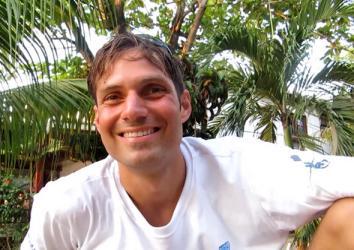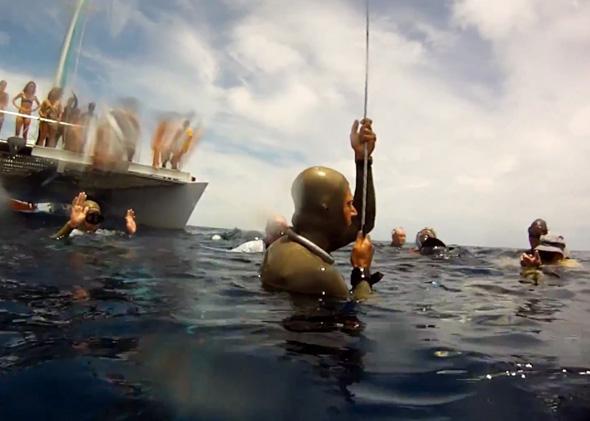A 32-year-old Brooklyn man died attempting to break an American freediving record on Sunday. Nicholas Mevoli tried to reach a depth of 236 feet without fins and return to the surface safely on a single breath, but despite years of training, he lost consciousness shortly after surfacing and was later declared dead.* Can practice improve your ability to hold your breath?
Yes. Most untrained people can comfortably hold their breath for 30 seconds before gasping. That threshold has little to do with oxygen—your body has plenty of that in reserve. The more dangerous problem is the buildup of carbon dioxide, which acidifies the blood. With training, freedivers seem less prone to this condition, as their blood acidifies more slowly than that of ordinary people. In addition, the peripheral blood vessels of experienced freedivers restrict quickly when they stop breathing, shunting blood away from unnecessary luxuries like hands and feet and protecting the brain. Breath-holding pros may also decrease their heart rate more quickly and dramatically in the absence of air, thus reducing their need for oxygen and the buildup of carbon dioxide. (Before beginning your career as a competitive breath-holder, you should know that experts still aren’t sure whether chronic breath-holding has negative long-term effects on the body.)
You can also train yourself to take deeper breaths. Many freedivers use a technique called “lung packing.” They take the deepest breath possible, then use the epiglottis to hold the throat shut and take in a mouthful of air with fully puffed cheeks. Using the tongue as a sort of rake, the trainee attempts to shove the air from the mouth into the lungs. Once that mouthful is packed down, the diver repeats the process. Some claim that the trick can stuff 3 additional liters of oxygen into the lungs. (Under normal circumstances, the average lung capacity is 4 liters for females and 6 liters for males.) Lung packing and other breathing exercises probably don’t stretch out your lungs permanently, like a rubber band that loses its elasticity, but they may help loosen the muscles that help you breathe, resulting in a gradually increasing capacity to take in air. Accomplished freediver Herbert Nitsch has a reported lung capacity of 14 liters. He likely started out with a naturally higher-than-average capacity, but training definitely contributed to that volume.
Ordinary cardiovascular training, such as running or biking, likely has little effect on how long you can hold your breath, but exercise is crucial for freedivers. They need to swim to the depths with as little exertion as possible to save oxygen for their brains.

Courtesy Carlos Correa/YouTube
Improvements in physical training alone can’t fully explain the incredible increase in breath-holding world records, though. Harry Houdini was renowned for his ability to hold his breath for three and a half minutes in the early 20th century. Five years ago, his fellow illusionist David Blaine broke the world record for breath-holding with a total of 17 minutes and 4 seconds. Even that record has since been broken several times, and now stands at over 22 minutes, a sixfold improvement in a century. By comparison, the record for the men’s 100-meter dash has decreased by only about 10 percent over the same period. Much of the improvement in breath-holding is attributable to the mental side of things: relaxation and meditation techniques, and the confidence that comes with understanding the mechanisms behind surviving anoxia.
Jacques Mayol may be the best empirical evidence for the advantages of breath-hold training. The Frenchman was the first freediver to reach 60 meters (197 feet), in 1966. Seventeen years later, at the age of 56, Mayol broke his own personal best by diving to 105 meters (344 feet). Several other accomplished freedivers, such as Enzo Maiorca, achieved personal records late in life. Because of the psychological and physical benefits that come from training and experience, freediving isn’t necessarily a young man’s sport.
Got a question about today’s news? Ask the Explainer.
*Correction, Nov. 19, 2013: This article incorrectly described the type of freediving record Mevoli was attempting when he died. (Return.)
